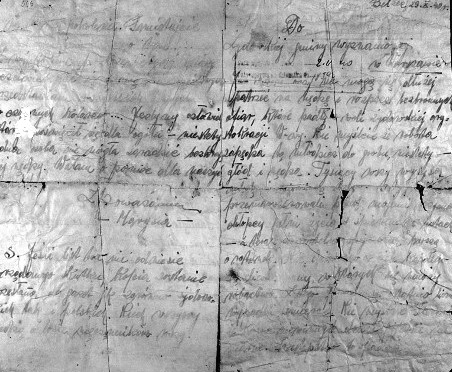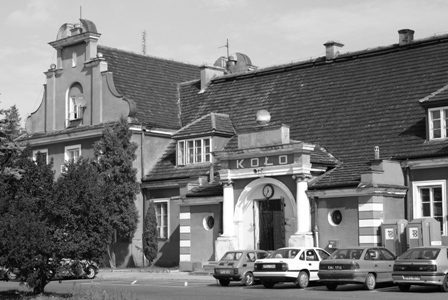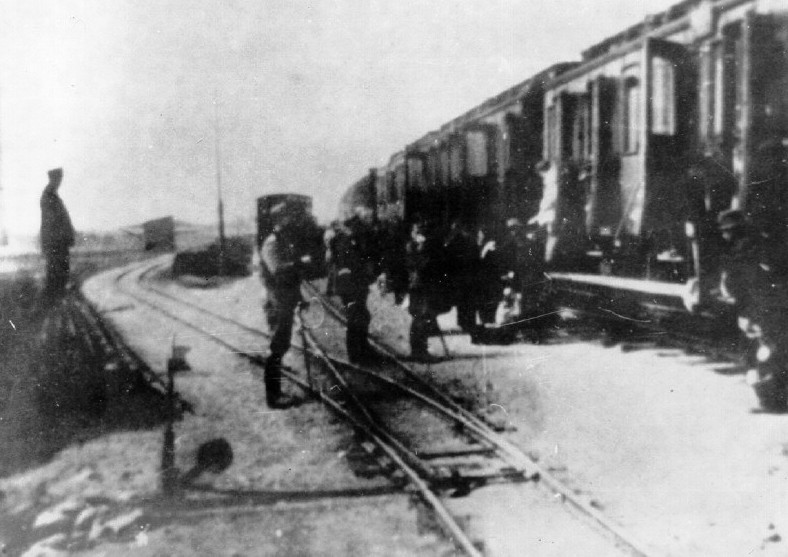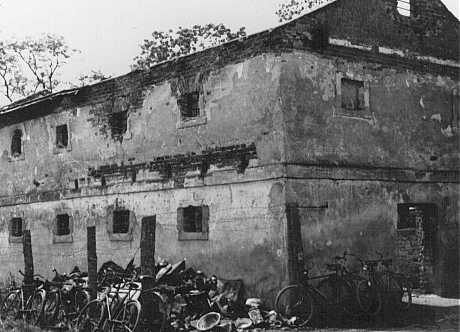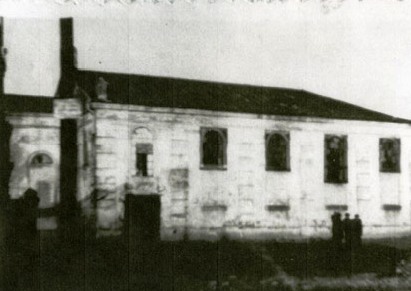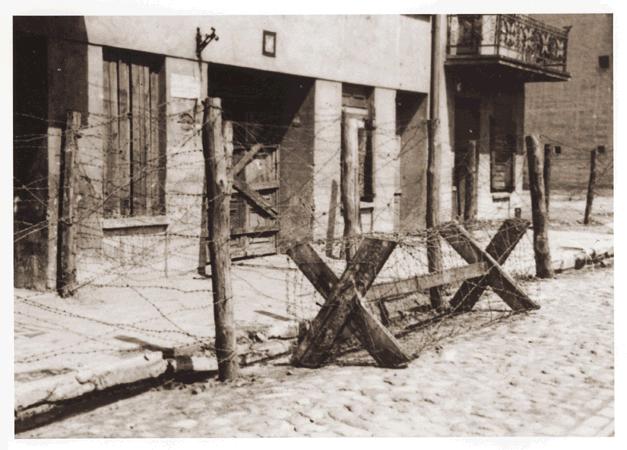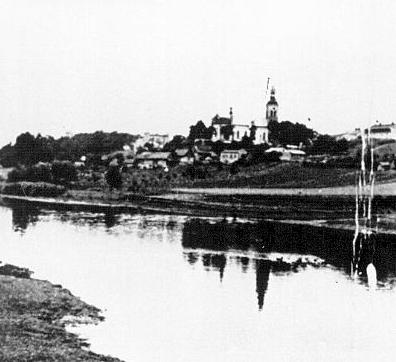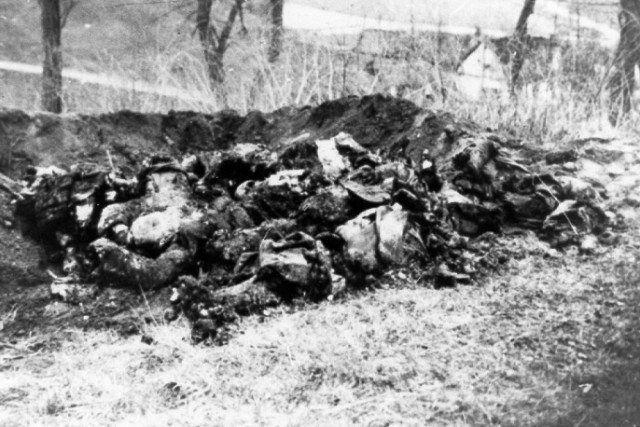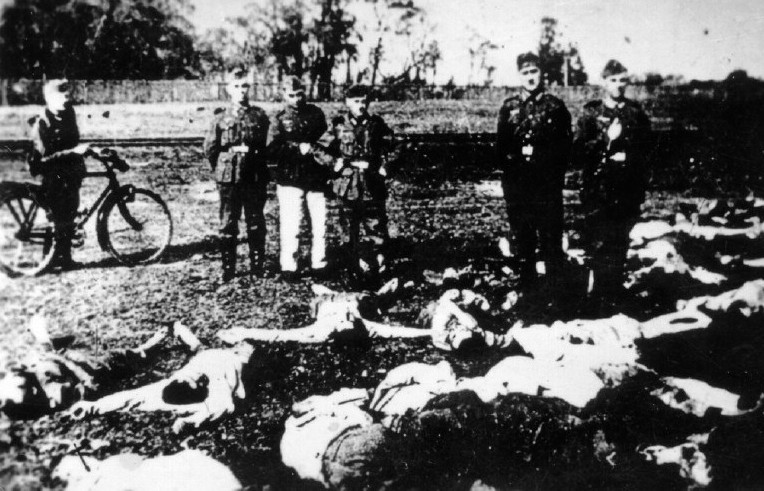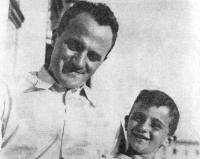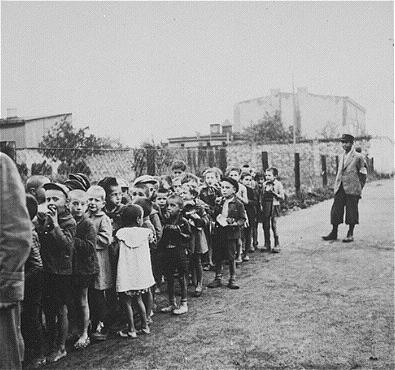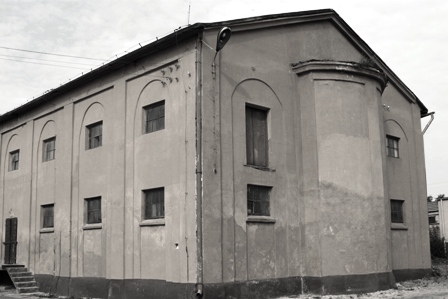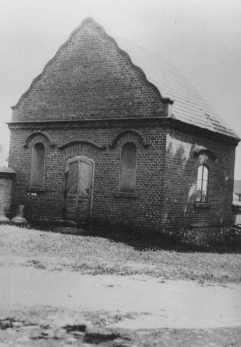Holocaust Education & Archive Research Team |
|
Other Camps
Key Nazi personalities in the Camp System The Labor & Extermination Camps
Auschwitz/Birkenau Jasenovac Klooga Majdanek Plaszow The Labor Camps
Trawniki
Concentration Camps
Transit Camps
|
||||||||
Chelmno Diary "Szlamek Bajler recounts his time at Chelmno"
Szlamek Bajler was a young Jew from the village of Izbica Kujawska, north of Kolo (German: Warthbrücken) and Chelmno (German: Kulmhof), in the annexed "Warthegau". Bajler was arrested in a round-up in Izbica in early January 1942, and forced to work in the Chelmno “Waldlager.”
He witnessed the destruction of most of the 1,600 Jews of his native village, included his own family, about a week later. Five days after the massacre Bajler escaped from the Waldlager. He managed to get to the Warsaw Ghetto where he told his story to Emanuel Ringelblum who urged him to write it down. Bajler did so under the pseudonym Yakov Grojanowski.
It should be noted that there is much confusion about his correct name, some sources claim it was Szlojme Fajner. We have used the name Bajler throughout this account, and in other places on the website. This is an extract of his account, as contained in the Ringelblum archive:
Bajler and his 28 fellow prisoners were taken in a truck, firstly in the direction of Kolo, it then took the road to Chelmno death camp. In Chelmno the truck waited on the road for about half an hour, then it drove into the palace grounds:
Tuesday, 6 January 1942:
We fifteen were confined in one room, the remaining fourteen in another. Down in the cellar it was pitch dark. Some Ethnic Germans on the domestic staff provided us with straw. Later a lantern was brought. At around eight in the evening we received unsweetened black coffee and nothing else. We were all in a depressed mood.
One could only think of the worst, some were close to tears. We kissed and took leave of each other. It was unimaginably cold and we lay down close together. We spent the whole night without shutting our eyes. We only talked about the deportation of Jews, particularly from Kolo and Dabie. The way it looked, we had no prospect of ever getting out again."
At about 8:30 we were led into the courtyard. Six of us had to go into the second cellar room to bring out two corpses. The dead were from Klodawa, and had hanged themselves. They were conscript grave-diggers. Their corpses were thrown on a lorry.
We met the other fourteen enforced grave-diggers from Izbica. As soon as we came out of the cellar we were surrounded by twelve gendarmes and Gestapo men with machine guns. We got on the lorry. Our escorts were six gendarmes with machine guns.
Behind us came another vehicle with 10 gendarmes and two civilians. We drove in the direction of Kolo for about 7 km’s till turning left into the forest; after half a kilometre we halted at a clear path. We were ordered to get down and line up in double file. An SS man ordered us to fall in with our shovels, dressed, despite the frost, only in shoes, underwear, trousers and shirts. Our coats, hats, gloves, etc., had to remain in a pile on the ground. The two civilians took all the shovels and pick-axes down from the lorry. Eight of us who weren’t handed any tools had to take down the corpses.
Already on our way into the forest we saw about fourteen men, enforced grave-diggers from Klodawa, who had arrived before us. The eight men
It was specially constructed. It looked like a normal large lorry, in grey paint, with two hermetically closed rear doors. The inner walls were of steel metal. There weren’t any seats. The floor was covered by a wooden grating, as in public baths, with straw mats on top. Between the driver’s cab and the rear part were two peepholes. With a torch one could observe through these peepholes if the victims were already dead.
Under the wooden grating were two tubes about 15 cm’s thick which came out of the cab. The tubes had small openings from which gas poured out. The gas generator was in the cab, where the same driver sat all the time. He wore a uniform of the SS death’s head units and was about forty years old. There were two such vans. When the lorries approached we had to stand at a distance of 5 m from the ditch. The leader of the guard detail was a high-ranking SS man, an absolute sadist and murderer. He ordered that eight men were to open the doors of the lorry. The smell of gas that met us was overpowering. The victims were gypsies from Lodz. Strewn about the van were all their belongings: accordions, violins, bedding, watches and other valuables. After the doors had been open for five minutes orders were screamed at us, ‘Here! You Jews! Get in there and turn everything out!’ The work didn’t progress quickly enough. The SS leader fetched his whip and screamed, ‘The devil, I’ll give you a hand straight away!’ He hit out in all directions on people’s heads, ears and so on, till they collapsed. Three of the eight who couldn’t get up again were shot on the spot. When the others saw this they clambered back on their feet and continued the work with their last reserves of energy.” “The corpses were thrown one on top of another, like rubbish on a heap. We got hold of them by the feet and the hair. At the edge of the ditch stood two men who threw in the bodies. In the ditch stood an additional two men who packed them in head to feet, facing downwards. If any space was left, a child was pushed in. Every batch comprised 180 - 200 corpses.
For every three vanloads twenty men were used to cover up the corpses. At first this had to be done twice, later up to three times, because nine vans arrived (that is nine times sixty corpses). At exactly 12 noon we had to put our shovels down and to climb out of the ditch. We were surrounded by guards all the time. We even had to excrete on the spot. We went to the spot where our belongings were. We had to sit on them close together. We were given cold bitter coffee and a frozen piece of bread. That was our lunch. That’s how we sat half an hour. Afterwards we had to line up, were counted and led back to work. What did the dead look like? They weren’t burnt or black; their faces were unchanged. Nearly all the dead were soiled with excrement. At about five o’clock we stopped work. The eight men who had worked with the corpses had to lie on top of them face downwards. An SS man with a machine gun shot at their heads. We dressed quickly and took the shovels with us. We were counted and escorted to the lorry by gendarmes and SS men. We had to put the shovels away. Then we were counted again and pushed into the lorry. The journey to the Schloss took about 15 minutes. We travelled together with the men from Klodawa and talked very quietly together, so the gendarmes sitting at the back shouldn’t hear us.
It turned out that there were many more rooms in the Schloss. We numbered twenty in our room, with fifteen more in the adjacent one. There weren’t any other enforced grave diggers. As soon as we came into the cold and black cellar we threw ourselves down on the straw and cried about everything that had befallen us.” With Bajler in that cellar were a 15 year-old boy named Monik Halter, 40 year-old Meir Pitrowski and 55 year-old Gershon Praschker, all from Izbica Kujawska. The latter invited his fellow prisoners to say the prayer of confession and penitence before death. One of us exclaimed ‘Who knows who among us will be missing tomorrow.’ We pressed close together and lapsed into exhausted fitful sleep haunted by terrible dreams. We slept for about four hours. Then we ran about the room freezing cold and debating the fate that was in store for us.”
“Two hours later the first lorry arrived full of Gypsies. I state with one hundred per cent certainty that the executions had taken place in the forest. In the normal course of events the gas vans used to stop about one hundred metres from the mass graves. In two instances the gas vans, which were filled with Jews, stopped twenty metres from the ditch. This happened once on this Thursday, the other time on Wednesday the 14th.”
At the same moment frightful screaming, shouting and banging against the sides of the van could be heard. That lasted for about fifteen minutes. Then the driver re-boarded the van and shone an electric torch into the back to see if the people were already dead. Then he drove the van to a distance of five metres from the ditch.” Back in the cellar, the Jews were ordered by the guards to sing. Meir Pitrowski and Jehuda Jakubowicz, from Wloclawek, begged Bajler to stand up and sing. So he did:
“’Friends and honourable people, get up and sing after me; first we shall cover our heads.’ I began to sing ‘Hear! O Israel, the eternal one is our God, the eternal one is unique’. Those assembled repeated each verse in depressed tones. Then I continued: ‘Praised be his name and the splendour of his realm for even and ever’, which the others repeated after me three times.
The gendarme insisted that we go on. I said ‘Friends and honourable people, we shall now sing the Hatikvah.’ And we sang the anthem with our heads covered. It sounded like a prayer. After this the gendarme left and bolted the door with three locks. Later that evening the prisoners had to sing again. They had to repeat ‘We thank Adolf Hitler for everything’. By five in the morning everybody was awake because of the cold. We had a conversation. Getzel Chrzastowski, a member of the Bund, and Eisenstab, both from Klodawa (Eisenstab owned a furriers in Klodawa), had lost their belief in God because he didn’t concern himself with injustice and suffering. In contrast others, myself included, remained firm in our belief and said, like Mosche Asch (a worthy man from Izbica), that the time of the Messiah was at hand.” On arrival back at the at the courtyard of Schloss Kulmhof we were disagreeably surprised to see a new transport. They were probably a new batch of grave-diggers: sixteen men from Izbica and sixteen from Bugaj. Among those from Izbica were 1. Moshe Lesek, 40 years old, 2. Avigdor Palanski, 20 years old, 3. Steier, 35 years old, 4. Knoll, 45 years old, 5. Izchak Preiss, 45 years old, 6. Jehuda Lutzinski, 51 years old, 7. Kalman Radzewski, 32 years old, 8. Menachem Archijowski, 40 years old. Among those from Bugaj was my friend and comrade Haim Reuben Izbizki, 35 years old. Twenty of the old grave-diggers, together with five new ones, were driven into another room in the cellar. This room was somewhat smaller than the previous one. There we found bedding, underwear, trousers, suits as well as food-stuffs (bread, dripping, and sugar). These items belonged to the new grave-diggers. We heard voices from the adjacent room. I banged at the wall and shouted at a spot where a missing brick let the air through. I asked if H.R. Izbizki was in the room. He came to the wall. I asked if at least his mother and sister had escaped. The guard interrupted our conversation. Afterwards the new arrivals gave us some political news. They said the Russians had already retaken Smolensk and Kiev, and were making their way towards us. We wished they would with God’s assistance come and destroy this terrible place." Seven to eight transports were buried this day, at first Gypsies as yesterday but the last two containing Jewish victims.
They even examined anuses (and, in the case of women, genitals). The entire examination was done most brutally.” All the victims were from Klodawa. “Eisenstab told us he had no further reason for living since his wife and 15 year-old only daughter had just been buried. But his fellows restrained him from asking the Germans to shoot him. Today seven transports arrived."
Sunday, 11 January 1942: At 8:30 we were already at work. At 9:30 the first gas van appeared. Among the ‘eight’ were Aharon Rosenthal, Schlomo Babiacki and Schmuel Bibedgal, all of them aged between fifty and sixty.” Only the five oldest of the ‘eight’ would be shot at the end of the day. Back in the cellar from the adjacent room came the message that “the Germans had captured an escaped Jew from Klodawa. Next morning they told us the following details: the captured escaper, Mahmens Goldmann, had told them in detail how the Jews were driven into the gas vans. When they arrived at the Schloss they were at first treated most politely. An elderly German, around sixty, with a long pipe in his mouth, helped the mothers to lift the children from the lorry. He carried babies so that the mothers could alight more easily and helped dotards to reach the Schloss. The unfortunate ones were deeply moved by his gentle and mild manner. They were led into a warm room which was heated by two stoves. The floor was covered with wooden gratings as in a bath-house. The elderly German and the SS officer spoke to them in this room. They assured them they would be taken to the Lodz Ghetto. There they were expected to work and be productive. The women would look after the household, the children would go to school, and so on. In order to get there, however, they had to undergo delousing.
For that purpose the needed to undress down to their underwear. Their clothes would be passed through hot steam. Valuables and documents should be tied up in a bundle, and handed over for safe keeping. Whoever had kept banknotes, or had sewn them into their clothes, should take them out without fail, otherwise they would get damaged in the steam oven. Moreover they would all have to take a bath.
The elderly German politely requested those present to take a bath and opened a door from which 15 - 20 steps led down. It was terribly cold there. Asked about the cold, the German said gently they should walk a bit further: it would get warmer. They walked along a lengthy corridor to some steps leading to a ramp. The gas van had driven up to the ramp. The polite behaviour ended abruptly and they were all driven into the van with malicious screams. The Jews realised immediately they were facing death. They screamed, crying the prayer ‘Hear! O Israel’.
At the exit of the warm room was a small chamber in which Goldmann hid. After he had spent 24 hours there in the icy cold and was already quite stiff, he decided to look for his clothes and to save himself. He was caught and pushed in among the grave-diggers.”
We buried nine transports; after work, five of the men who had unloaded the corpses were shot. When in our cellar Michael Worbleznik burst into tears; he had lost his wife, two children and his parents. The question how one could escape in order to warn the whole Jewish population” was intensively discussed, not solved that night." On this day one of the vans drove in error right up to the ditch. We heard the muted cries for help and knocking at the door of the tortured victims. At the end of the day six men of the ‘eight’ were shot.” Michael Podklebnik followed my example and we said the prayer of the mourners together. Before leaving the ditch five of the ‘eight’ were shot. At seven in the evening we were taken back home. All those who hailed from Izbica were in absolute despair. We had realised that we should never see our relatives again. I was quite beside myself and indifferent to everything. In the next room, we had learnt, were eighteen grave-diggers from Lodz. We heard through the wall that Rumkowski (the elder of the Jewish Council at Lodz) had ordered the deportation of 750 families from Lodz.”
Friday, 16 January 1942:
Because it was Sunday not all the gendarmes were on duty. We consumed our lunch in the grave. They probably wanted to make sure that we didn’t attack any of them. We didn’t even attempt to hurl ourselves upon our executioners. The guns levelled at us filled us with too much fear. After the evening prayer we decided to run away, no matter what the cost. I asked Kalman Radzewski to give me a few marks because I didn’t have a single Pfennig. He gave me 50 marks which he had sewn into his clothing. The escape of Rois was an example that had made a deep impression on me because he got out through a cellar window.” Monday, 19 January 1942: “We again boarded the bus in the morning. I let all the others get on in front of me and was the last one aboard. The gendarme sat in front. On this day no SS men rode behind us. To my right was a window which could be opened easily. During the ride I opened the window. When fresh cold air streamed in I caught fright and quickly shut the window again.
My comrades, among them Monik Halter in particular, encouraged me, however. after I made a decision I softly asked my comrades to stand up so the draught of cold air shouldn’t reach the gendarmes. I quickly pulled the window pane out of its frame, pushed my legs out and turned around. I held on to the door with my hands and pressed my feet against the hinges. I told my colleagues they should put the window pane back immediately after I had jumped. I then jumped at once. While I warmed myself I asked cautiously about the distance to Chelmno. It was only 3 km’s. I also received a piece of bread which I put in my pocket. As I was about to go the peasant asked me if I was a Jew – which I absolutely denied. I asked him why he suspected me, and he told me they were gassing Jews and Gypsies at Chelmno. I took my leave with the Polish greeting and went away.” “’Rabbi, I am a Jew from the nether world!’ He looked at me as if I was mad. I told him: ‘Rabbi, don’t think I am crazed and have lost my reason. I am a Jew from the nether world. They are killing the whole nation Israel. I myself have buried a whole town of Jews, my parents, brothers and the entire family. I have remained lonely as a piece of stone.’ I cried during the conversation.
The rabbi asked: ‘Where are they being killed?’ I said: ‘Rabbi, in Chelmno. They are gassed in the forest and buried in mass graves.’ His domestic (the rabbi was a widower) brought me a bowl of water for my swollen eyes. I washed my hands. The injury on my right hand began to hurt. When my story made the rounds many Jews came, to whom I told all the details. They all wept. We ate bread and butter; I was given tea to drink and said the blessing.” "My dearest ones,
The place where everyone is being put to death is called Chelmno, not far from Dabie; people are kept in the nearby forest of Lochow. People are killed in one of two ways: either by shooting or by poison gas. This is what happened to the towns of Dabie, Izbica Kujawska, and others.
Recently, thousands of Gypsies have been brought there from the so-called Gypsy Camp in Lodz and the same is done to them. Do not think that a madman is writing; unfortunately, it is the cruel and tragic truth (Good God!).
O man, throw off your rags, sprinkle your head with ashes, or run through the streets and dance in madness...I am so wearied by the sufferings of Israel, my pen can write no more. My heart is breaking. But perhaps the Almighty will take pity and save the 'last remnants of our People'.
Sources:
The Holocaust – The Jewish Tragedy by Martin Gilbert, published by William Collins Sons & Co. Limited, London, 1986 Polish State Archvies The Museum of Chelmno Chelmno witnesses Speak – The District Museum in Konin The Good Old Days – Willi Dressen, Ernst Klee, Volker Reiss The Chronicle of the Lodz Ghetto – Lucjan Dobroszycki Holocaust Journey – Martin Gilbert
Copyright Chris Webb H.E.A.R.T 2010
|
